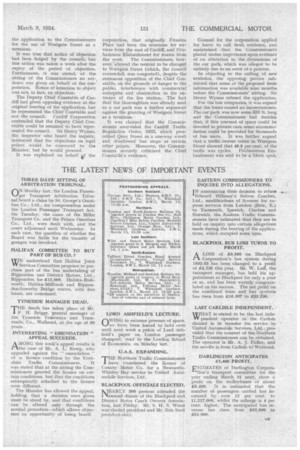THREE DAYS' HEARING OF CARDIFF CORPORATION APPEAL
Page 130

Page 131

If you've noticed an error in this article please click here to report it so we can fix it.
Important Points Raised in Case Against Four Bus Companies THREE days were occupied, last 1 week, in the hearing of the appeal of Cardiff Corporation against the action of the South Wales Traffic Commissioners in permitting the Rhondda Tramways Co., Ltd., Neath and Cardiff Luxury Coaches, Ltd., Western Welsh Omnibus Co., Ltd., and Lewis and
£64 James, Ltd., to use Westgate Street, Cardiff, as a terminus.
One of the counsel for the objectors protested against the lodging of what he described as "hopeless appeals" by local authorities, involving heavy, un
recoverable costs for the bus companies involved.
At the outset, counsel for the Neath and Cardiff, Western Welsh and Lewis and James concerns submitted that the appeal was invalid and could not be proceeded with. It was claimed that the corporation had not objected to the application to the Commissioners for the use of Westgate Street as a terminus.
It was true that notice of objection had been lodged by the council, but this action was taken a week after the expiry of the period of objection. Furthermore, it was stated, at the sitting of the Commissioners no evidence was given on behalf of the corporation. Notice of intention to object was not, in fact, an objection.
The Deputy Chief Constable of Cardiff had given opposing evidence at the original hearing of the application, but he represented the Chief Constable and not the council. Cardiff Corporation contended that the Deputy Chief Constable could be assumed to have represented the council. Sir Henry Wynne, the inspector who heard the inquiry, intimated that the objections on legal points would be conveyed to the Minister, but he would proceed.
It was explained on behalf f the corporation, that originally Fitzalen Place had been the terminus for services from the east of Cardiff, and Fitshammon Embankment for routes from the west. The Commissioners, however, allowed the termini to be changed to Westgate Street (which, the council contended, was congested), despite the strenuous opposition of the Chief Constable, on the grounds of danger to the public, interference with commercial enterprise and obstruction to the entrance of the fire station. The fact that the thoroughfare was already used as a car park was a further argument against the granting of Westgate Street as a terminus.'
It was claimed that the Commissioners over-ruled the Cardiff Traffic Regulation Order, 1933, which prescribed Quay Street as a one-way street and disallowed bus stops at certain other points. Moreover, the Commissioners severely criticized the Chief Constable's evidence. Counsel for the corporation applied for leave to call fresh evidence, and maintained that the Commissioners placed undue importance upon evidence of an alteration in the dimensions of the car park, which was alleged to be entirely due to an error of a painter.
In objecting to the calling of new evidence, the opposing parties submitted that some of the proposed fresh information was available nine months before the Commissioners' sitting. Sir Henry Wynne refused the application.
For the bus companies, it was argued that the buses caused no inconvenience. The car park was now some 533 ft. long and the Commissioners had decided that, if this amount of space could be devoted to private cars, some accommodation could be provided for thousands of bus users. It was further argued that a traffic census taken in Westgate Street showed that 48.8 per cent, of the traffic was cycles. Fitzhammon Embankment was said to be a bleak spot.












































































































































































